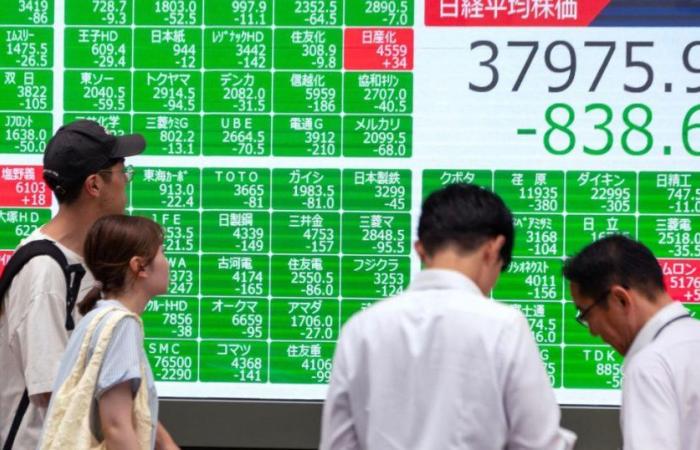The Tokyo Stock Exchange ended in decline on Thursday, weighed down by profit-taking after three sessions of increases, while the depths reached by the yen raised the specter of possible new intervention by the Japanese government. The flagship Nikkei index of the Japanese capital lost 0.82% to 39,341.54 points and the broader Topix index fell 0.33% to 2,793.70 points.
Chinese stock markets were also at half mast: Hong Kong’s Hang Seng index fell 2% around 06:40 GMT after the publication on Thursday of data showing a clear slowdown in industrial profits in China in May, both over one month and over a year, fueling concerns about the health of the world’s second largest economy.
The Shanghai composite index dropped 0.6% and that of Shenzhen 1.3%. Investors in Chinese markets were also concerned about the weakening of the yen and the surge in the dollar, which raised concerns about a loss of currency competitiveness in the Asia-Pacific region.
The Japanese currency briefly fell during the night from Wednesday to Thursday near the mark of 160.90 yen per dollar, reaching before rebounding from the abyss which had not been explored since 1986, and beyond the level which had triggered interventions by the Japanese government in late April and early May. Japanese Finance Minister Shunichi Suzuki said Thursday “very concerned about the impact (of this fall in the yen) on the economy” local, adding that the government was ready to “take appropriate measures if necessary”.
“The weakening of the yen may benefit exporting groups, but it could exacerbate inflationary pressures in Japan, creating a policy dilemma for the authorities”, commented brokers on the AlgoTradeAlert.com site. Previous interventions, however, have had a limited effect, highlighting the difficulty for Tokyo to defend its currency while the American Federal Reserve shows no immediate inclination to lower its key rates.
The yen is weakened by the large gap between the monetary tightening of major Western central banks and the accommodative policy of the Bank of Japan (BoJ). This did not rule out a rate increase from the end of July, if the new macroeconomic data available by then allowed it. Inflation in the Japanese archipelago has exceeded the BoJ’s 2% target for more than two years, but the institution wants to achieve inflation driven by demand, thanks to wage increases and more dynamic domestic consumption. .
On the value side, certain Japanese stocks linked to semiconductors fell after the announcement of disappointing forecasts by the American giant Micron Technology: Screen Holdings, whose rating was also downgraded by Mizuho Securities, dropped 5.7%. , and Tokyo Electron 2.4%. The yen rose against the dollar, which was worth 160.47 yen around 06:40 GMT against 160.81 yen on Wednesday at 21:00 GMT.
Read alsoEuropean stock markets open slightly higher
The euro, which reached a historic peak against the yen overnight, also fell to one euro for 171.60 yen against 171.75 yen the day before at 9:00 p.m. GMT. And the European currency was trading at $1.0693, compared to $1.0681 on Wednesday. Oil was in slight decline: around 06:30 GMT the barrel of American WTI lost 0.11% to 80.81 dollars and that of Brent from the North Sea dropped 0.07% to 85.19 dollars.






